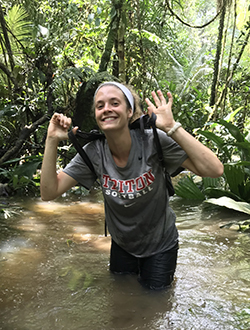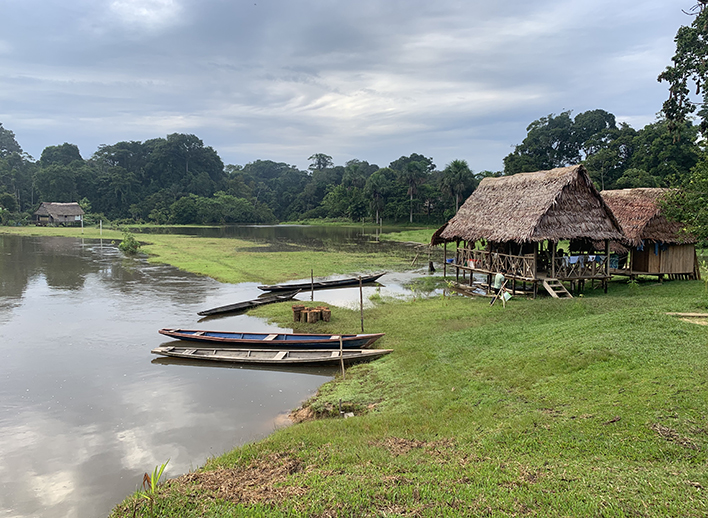Recent graduate completes first international MS in Global Health thesis studying the knowledge, attitudes, and practices related to malaria of an indigenous group in the Peruvian Amazon.
“I’m really interested in looking at Global Health through a One Health lens, which is increasingly important during this time of COVID-19, as we expect more diseases such as this to spillover from animals to humans in the future,” explained Hogan. “One Health is a transdisciplinary approach to health which recognizes the interconnectedness between human, animal, and environmental health.”

For her master's thesis, Kathryn Hogan traveled to Peru to explore how the Maijuna experience and perceive malaria, and how those experiences and perceptions shape preventative and treatment-seeking behavior.
Hogan chose to pursue her master’s degree at Mason because of the faculty focus on using a One Health approach to study zoonotic diseases, the University’s location in the Washington, D.C. area, and the endless opportunities the area provides for public and global health.
“When researching programs for my master’s, I was interested in Mason’s opportunities and I saw that Dr. Michael von Fricken focused on this One Health perspective,” she added. “That drove me to apply to Global Health programs and their Graduate Research Assistantships at Mason.”
The MS in Global Health at Mason requires that students complete a thesis on a topic of their choice as a culminating experience for the degree, and Hogan chose to complete her thesis in Peru, becoming the first student in the department to complete a thesis abroad. She expects more students will take this opportunity to do international research for their projects in the future.
She was inspired by an international field course she took earlier in her Mason program, Conservation and Sustainability in the Amazon with Dr. Michael Gilmore and Dr. Andrew Wingfield, run through the Center for Field Studies. The course was co-taught by members of the indigenous Maijuna people of the community of Sucusari, Peru. The course focused on conservation of biological and cultural diversity and environmental justice, but malaria transmission came up in conversation with community members. Malaria is still prevalent in many parts of South America, mainly within regions of the Amazon rainforest in Peru and Brazil.
“This sparked a conversation with Dr. Gilmore and I about the history of malaria in the community, why there appeared to be confusion in the community about malaria transmission, and if the community was receiving health programming and resources from the Peruvian government,” elaborated Hogan.
After constructing the framework of the study, Hogan received funding to conduct research in Peru through Mason’s Global Praxis program.
Hogan’s study was designed to explore how the Maijuna experience and perceive malaria, and how those experiences and perceptions shape preventative and treatment-seeking behavior. She found that perceptions of malaria were rooted in a mixture of tradition, personal experiences, and past teachings from local government programs. Confusion surrounding transmission could likely be avoided through culturally-appropriate health workshops.
During her qualitative, interview-based research, Hogan stayed in one of the Maijuna communities called Sucusari, in Loreto, Peru. She stayed in a traditional house built for field studies by a local NGO, OnePlanet, with other bilingual researchers which helped her as she adjusted to new cultural norms and language.

During her qualitative, interview-based research, Hogan stayed in one of the Maijuna communities called Sucusari, in Loreto, Peru.
“The Sucusari community members were very welcoming and gracious to allow me to stay in their community for three months and learn about their experiences, knowledge, attitudes, and practices surrounding malaria,” described Hogan.
In reflection, Hogan thinks the most rewarding part of the experience was the interest and support the community expressed during the very first meeting in Sucusari.
“When Dr. Gilmore and I introduced the research project to see if there was interest among community leadership, and then later among the whole community, there was a lot of support and interest in the project. The community members shared their experiences being sick or having family members who were sick or died from malaria in the past, so they were really interested in sharing that information. Because indigenous populations have historically been marginalized and exploited for research or economic gain, doing ethical work that was of interest and benefit to the community was of utmost importance,” Hogan emphasized.
After completing her thesis and graduating from Mason in spring of 2020, Hogan began a full-time role as a Health Analyst at MITRE. In the future, she plans to pursue a doctoral degree.
